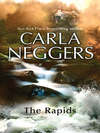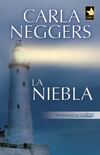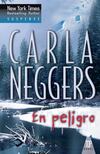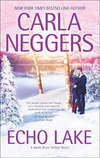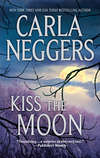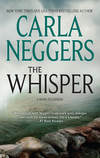Loe raamatut: «The Rapids»
Praise for the novels of
CARLA NEGGERS
“No one does romantic suspense better!”
—New York Times bestselling author Janet Evanovich
“Neggers’s brisk pacing and colorful characterizations sweep the reader toward a dramatic and ultimately satisfying denouement.”
—Publishers Weekly on The Cabin
“These pages don’t just turn; they spin with the best of them.”
—BookPage on The Waterfall
“Neggers delivers a colorful, well-spun story that shines with sincere emotion.”
—Publishers Weekly on The Carriage House
“Suspense, romance and the rocky Maine coast—what more can a reader ask for? The Harbor has it all. Carla Neggers writes a story so vivid you can smell the salt air and feel the mist on your skin.”
—New York Times bestselling author Tess Gerritsen
“Tension-filled story line that grips the audience from start to finish.”
—Midwest Book Review on The Waterfall
“Carla Neggers is one of the most distinctive, talented writers of our genre.”
—New York Times bestselling author Debbie Macomber
CARLA NEGGERS
The Rapids

ACKNOWLEDGMENTS
A special thank-you to my Dutch cousins Henk and Christine Nouwen, Jan and Martha van de Leur, Amy Knechten, Sonja van den Akker and Bart, Leo, Marie Louise, Nanny and Rob Neggers for their warm welcome and many family stories on our visits to the Netherlands. Christine was my “Dutch pen pal” when I was growing up in small-town western Massachusetts and she was growing up in Eindhoven. Henk—who for some mysterious reason thinks the Neggers family is a bit argumentative!—went above and beyond the call of duty in answering my many questions for this book and even put me in touch with a Dutch police inspector, who was equally generous with his time and expertise. I’ve promised to keep working on my Dutch vocabulary…but I’ll never get those “g’s” down!
I’m so glad we got to see my cousin Carla, for whom I’m named, before her recent death. I will always remember our lunch in her beautiful garden…she and her husband, Daan, had the most gorgeous roses….
Many thanks to the deputy U.S. marshal who was so gracious and helpful in talking with me, and to my brother Mark and sister-in-law Kathy Neggers for showing me around the scenic and very special Hudson River Valley.
As I write this, hiking season is about to get under way here in northern New England. I’m still determined to hike all forty-eight peaks over 4,000 feet in the White Mountains…but it’s going to take a while, because I really like walking on the beach, too! I’m also diving into my next book. If you’d like to get in touch with me, please visit my Web site, www.carlaneggers.com.
Thank you, and take care!
Carla Neggers
P.O. Box 826
Quechee, VT 05059
To Kate Jewell and Conor Hansen
Contents
Chapter One
Chapter Two
Chapter Three
Chapter Four
Chapter Five
Chapter Six
Chapter Seven
Chapter Eight
Chapter Nine
Chapter Ten
Chapter Eleven
Chapter Twelve
Chapter Thirteen
Chapter Fourteen
Chapter Fifteen
Chapter Sixteen
Chapter Seventeen
Chapter Eighteen
Chapter Nineteen
Chapter Twenty
Chapter Twenty-One
One
Maggie Spencer stood paralyzed in front of the glass case in a small Dutch bakery not far from her apartment. Decisions, decisions. She’d arrived at the American embassy in The Hague three weeks ago, her first foreign assignment as a diplomatic security officer and already had fallen in love with Dutch bread.
“You’ll kill for a Krispy Kreme in another two months.”
She laughed as Thomas Kopac, a midlevel diplomat at the embassy, joined her. “Be careful. I’m talking myself out of chocolate sprinkles.”
“Ah. Hagelslag. It’s more like dessert than breakfast.”
“So’s Krispy Kreme.” Maggie smiled at him. “You said that so well. Hagelslag. My Dutch vocabulary is improving, but pronunciation? Forget it. Nobody understands what I’m saying.”
But she’d had chocolate sprinkles on buttered bread two mornings in a row and decided, instead, on a whole-grain roll with smoked gouda.
Tom didn’t order anything. “I just saw you in the window and figured I’d make you homesick.”
“Do I look like the doughnut-eating type?”
“Uh-uh. I’m not going there.”
They headed outside into the late August sun. A midnight rain had washed the humidity and pollution out of the air and perked up the summer roses and hydrangea blooming in dooryard gardens. The embassy was only a few blocks away. Maggie walked comfortably alongside Tom, a balding man in his mid-fifties who’d never married, a career foreign service officer who’d never rise to the top ranks of his profession. He was the sort who would wear the same suit for days on end. His job was his life. Maggie was trying to have more balance for herself, but it wasn’t easy. Still, she’d turned thirty in July and had already learned the hard way that life was too short.
There was, mercifully, nothing romantic in Tom’s offer of friendship.
“You can eat your broodje in front of me,” he said. “I would.”
“Do I look hungry?”
He smiled. “Starving.”
“I’ll have to pound the pavement after work to burn off the extra calories.”
Dutch breakfasts notwithstanding, she kept in shape. At five-five, she couldn’t count on her size to get her out of a jam. Fitness, training, experience and mental toughness were the trick.
And luck.
There was always the luck factor. But since luck wasn’t her long suit, she didn’t count on it, either.
“Look there,” Tom said. “Your hair’s the same color as those roses.”
She noticed the cluster of orange-red roses in a dooryard. “It’s not that red.”
“Is the red hair from your mother or your father?”
“Father.”
He hesitated. “I’m sorry. I didn’t mean—”
“It’s okay. I don’t mind talking about him.” She smiled to prove she wasn’t just being nice. “My wanderlust is also a Spencer trait.”
The day she’d arrived in The Hague was the eighteen-month anniversary of her father’s death. Philip Spencer, ordinary American businessman, had walked into the middle of a bank robbery in Prague.
Talk about no luck.
The bank robbers still hadn’t been caught. Nobody seemed to be looking too hard for them.
Maggie gave up on resisting, took her roll out of the bag and bit into it, welcoming the smokiness of the cheese and the softness of the bread. Normalcy. She had to establish her routines, focus on her job and continue to move forward with her life. She couldn’t dwell on the past. And it wasn’t her job to investigate her father’s death.
She and Tom walked up Lange Voorhout, a tree-lined street of stately historic buildings that was said to be one of the prettiest in The Hague, or, as it was known formally in Dutch, ’s-Gravenhage, which meant “the count’s hedge.” Even the Dutch shortened it to Den Haag. Although Amsterdam was the official capital, The Hague was the seat of the Dutch government and the residence of its royal family, as well as home to dozens of foreign embassies and the International Court of Justice.
The functional concrete American embassy was often called the ugliest building on Lange Voorhout, possibly in the entire city. The original embassy—presumably more graceful—had been accidentally destroyed by an Allied bomb during World War Two.
“Enjoy your bread and cheese,” Tom said cheerfully when they arrived. “And don’t work too hard.”
“You’re one to talk.”
He laughed. “Not me. An eighteen-hour day’s my limit.”
Maggie made her way to her desk, pouring herself a mug of coffee before she sat down. As a special agent for the U.S. State Department’s Diplomatic Security Service, she had a wide range of duties and responsibilities. First and foremost was the safety and security of the embassy’s personnel, property and information, whether in or out of the building, and of American citizens in the country. She’d completed six months of training at the Federal Law Enforcement Training Center in Brunswick, Georgia, then worked in U.S. diplomatic security field offices for four years, investigating passport and visa fraud. She’d come to The Hague straight from the Chicago field office, on the heels of a major joint counterterrorism investigation that had culminated in the arrest of a sophisticated trio of Americans producing and selling fraudulent visas.
She ate the last bite of her roll and drank some of her coffee.
Having a father killed by bank robbers in Prague hadn’t hurt her security clearance, nor did it even seem to trouble anyone—at least, not beyond sympathy for her loss.
It troubled her.
But she’d had to put her questions and doubts out of her mind, because there was nothing to be gained by sticking her nose into her father’s murder investigation. The American embassy in Prague and the FBI would keep her informed of any progress. She had her own job to do.
She buried herself in it, and by midafternoon, she realized she’d forgotten lunch. She found some peanut butter crackers in her desk and opened up a bottle of water as she scanned her e-mail.
Re: Nick Janssen.
Now, there was a subject heading, she thought, noticing the message was from a free e-mail account she didn’t recognize. She opened it up and took in the neatly typed words in a single glance, then read them over more slowly. Twice.
Special Agent Spencer,
You must hurry.
Nick Janssen is in ‘s-Hertogenbosch near the entrance of the Binnendieze boat tour. If necessary I can keep him there for another hour or so. But please hurry if you want him.
Sincerely,
A friend
Maggie read through the e-mail a fourth time.
A joke. It had to be.
Nick Janssen was an American fugitive with the rare distinction of being on the “most wanted” lists of both the FBI and U.S. Marshals Service. He’d fled the country a year ago to avoid prosecution for tax evasion. That was enough to put him in hot water with the FBI and the marshals, but he wasn’t considered violent. Then he tried to extort a presidential pardon, a disaster that had left three marshals wounded and three of his own men dead. That the whole mess had come to a climax in the backyard of the Tennessee boyhood home of the President of the United States didn’t help matters.
As if that weren’t plenty, Janssen’s antics also exposed him as the violent, amoral mastermind of a lucrative criminal network of buyers and sellers of illegal arms, drugs and commodities.
Charlene Brooker, an American army captain, was the first person to suspect he was more than a simple tax evader. Janssen had ordered her killed last fall while she was in Amsterdam.
He was in Amsterdam himself during the pardon debacle in May and had managed to disappear shortly after it all blew apart.
Everyone wanted his hide.
Since arriving in the Netherlands, Maggie had worked with various American and Dutch investigators on the Janssen case, but she couldn’t think of a single “friend” who would know Nicholas Janssen’s whereabouts and alert her by an anonymous e-mail.
’S-Hertogenbosch was a small city in the southern Dutch province of Noord-Brabant.
She didn’t know what in blazes the Binnendieze was. The name of a canal? A boat tour company?
You must hurry.
It was almost four o’clock.
Maggie abandoned her peanut butter crackers and got up to go find her boss.
Libby Smith welcomed the breeze that seemed to float up from the Binnendieze, the shallow waterway that encircled most of the old city of ’s-Hertogenbosch. “What happened to your dogs?”
“What?” Nick Janssen seemed confused, but it was obvious he hadn’t liked anything about their meeting from the moment she’d joined him on his bench. It was, he’d said rather pathetically, his favorite spot nowadays. “How did you know about my dogs?”
“Rhodesian ridgebacks, weren’t they?”
He’d dyed his distinctive silver hair a stupid-looking black. As notorious as he was, it was unlikely that anyone in the sleepy southern Dutch city would recognize him, even if he hadn’t colored his hair.
Tourists—most of them Dutch themselves—stood in line for the boat tour of the Binnendieze.
Libby was bored out of her mind. She’d put on a frumpy denim skirt, a cheap tank top and ergonomic sandals and carried a canvas bag over her shoulder loaded with all the usual tourist paraphernalia. Her .22-caliber Beretta was tucked inside her foldable, packable, squishable traveler’s rain jacket.
If necessary, she could get to the Beretta, shoot Nick Janssen and be gone before anyone realized what had happened. If people didn’t expect him to be an international fugitive, they didn’t expect her to be an accomplished killer.
But she hoped violence wouldn’t be necessary. She had very big plans for her new relationship with her fellow American.
“I had to give the dogs away,” he said.
She’d almost forgotten she’d asked about them. “That’s too bad. Still, it wouldn’t be easy to be on the lam with two dogs, never mind ones as large as they were.”
“Samkevich shouldn’t have sent you here,” Janssen said tightly. “We should have met somewhere else.”
“That would have had its own risks.”
Vlad Samkevich, a Russian who lived in London, was a well-known arms dealer who also had an international warrant out for his arrest. But he wasn’t as rich or as desperate as Janssen, and Libby needed someone who was both.
Janssen stared at the tourists talking loudly to one another in Dutch. “Samkevich says you’ve done work for him. You look like a child. How old are you?”
“Thirty-six.”
“You look younger.”
It wasn’t a compliment. She was small and wiry, and although her very short hair was prematurely gray, it still hadn’t added years to her appearance. It was her size and her cute face that made people think she was younger—always too young.
“I can do the job, Mr. Janssen,” she said. “Just give me your list.”
“I’ll need you to prove yourself.”
She was prepared. “I already have.”
He glanced sideways at her. “How?”
“I killed Vladimir Samkevich before I left London two days ago.”
No reaction from Janssen. Not shock, not respect, not anger.
Libby responded in kind and kept her mix of satisfaction and fear to herself. What if she’d guessed wrong? But she knew she hadn’t. The man next to her had no more feeling for the Russian than she did. “Samkevich wasn’t your friend. The authorities don’t have solid evidence on you. You were as much a victim in May as anyone else. You didn’t shoot the two marshals in Central Park or have the Dunnemores kidnapped in Amsterdam. Your guy had his own agenda.”
Janssen made a little noise at her mention of Stuart and Betsy Dunnemore, parents of one of the wounded marshals, friends of John Wesley Poe, the current U.S. president. Libby wasn’t sure she should have brought them up. Janssen had fancied himself in love with Betsy, his former college classmate, and tried to manipulate her into interceding on his behalf with Poe.
He’d thought Betsy would dump her elderly diplomat husband and marry him.
But Libby understood what it was to have unrealistic dreams, dreams everyone else thought were insane—not that most people gave a damn about anyone else’s hopes and dreams. Nick Janssen didn’t. He’d wanted a presidential pardon and let it be known he’d pay for one. He didn’t care who got hurt in the process. His blindness to the aspirations of others had backfired on him as well.
When he didn’t speak, she went on. “You had a guy use you in May for his own ends. The two men you sent to the States to clean up after him could have been a problem, too, but they’re dead. They can’t testify against you. They were two of your most trusted bodyguards, but who’s to say they wouldn’t have turned on you?”
“What does any of that have to do with Samkevich?”
“He could testify against you. The authorities were closing in on him. He knew it. He’d have cut a deal in a heartbeat, given them you in exchange for a lighter sentence.”
Janssen thought a moment. “You’re right, of course.”
She hid her relief. “I don’t want payment for him.”
“His body—”
“He won’t be discovered for a few more days.”
“You’re a very cold woman, Miss Smith.”
She tried not to bristle, but she wasn’t cold. Not at all. “I’m good at what I do.”
“This is a nice town,” he said absently. “I could have stayed here for a long time. I was on an island off the coast of Scotland for two months. Did you know that?”
“No,” she lied.
He seemed to like that, having one over her. “The food was terrible. Here…” He gave a wistful sigh. “I have other safe houses.”
“Of course.”
“I want to see my mother’s grave.” His words were soft and yet toneless, as if he’d said them so many times they’d lost their meaning, become an unattainable fantasy. “It’s within walking distance of where I grew up in northern Virginia. She died last winter.”
Libby squirmed. She’d gone to her father’s grave once, just so she could spit on it. “I’m sorry. Do you have your list?”
He looked at her again. “Yes. You really are very cold.” But he fished a white index card out of his shirt pocket and passed it to her. “Ten names. A hundred thousand dollars for each.”
She tucked the card into her canvas bag. “Excellent.”
“You didn’t look at any of the names.”
“There’s time for that. I’ll need a deposit of a hundred thousand dollars wired into my account.”
He nodded. “I’ll take care of it. Should I be arrested—”
“I’ll work faster and expect a bonus. Double.”
“That’s two million dollars.”
“You rich tycoons.” Libby smiled, hoisting her canvas bag higher onto her shoulder. “Always so good at math.”
She slid smoothly to her feet, noticing that Janssen didn’t so much as glance at her breasts straining against her tank top. Wrapped up in his own problems, she supposed.
She glanced at her watch. Four-fifteen. What to do with herself the rest of the day?
“I want this all to be over,” he said quietly.
“It will be. Patience.”
“The bonus?”
She’d started to move away from the bench, but his words—his cool tone—forced her to turn back.
“Any bonus would be paid only upon my release.” His eyes, a frosty blue, held her in place. “I wouldn’t want you to get any ideas.”
“Of course. I understand.”
She did, too.
She understood that one or two million—whichever amount Janssen ended up paying her—was a miniscule amount to him. And it wouldn’t satisfy her. She was finished being a bit player, a hired gun, an anonymous force in a larger game.
She wanted it all, and Nick Janssen was her vehicle for getting it.
You have no fellow feeling, do you?
The words came out of nowhere. The jolt of memory. Philip Spencer might have been perched on the branch of a nearby linden tree, speaking to her from the dead.
Her heart pounded, and she actually glanced around her, just to make sure he hadn’t somehow materialized in her shadow.
He’d tried to save her from herself.
Leaving Janssen on the bench, Libby hurried away. Glancing around, she noticed a balding man in a rumpled suit break off from the boat tour queue and walk down the street.
A prickly sensation crawled up her back.
Something’s wrong.
She walked into a small café and sat at a table inside, with her back to the wall so that she could see out the open front.
The balding man had disappeared.
She had good instincts. She was a superior shooter. But she wasn’t trained at surveillance, countersurveillance, any of those tricks of the trade. Mostly, she got along by guts and a willingness to take risks—and the unexpectedness of being a petite woman in her midthirties who killed people for pay.
It was possible she was wrong.
She bit into the small cookie that came with her coffee.
Five minutes later, Nick Janssen got up from the bench and stretched.
He walked to a fence overlooking the narrow waterway.
Ten minutes kicked by. He seemed transfixed. Libby drank her coffee. Something isn’t right.
Janssen turned and started toward the street. The Dutch police pounced.
An Arrestatieteam, their version of a SWAT team. They moved fast, intercepting their target, giving him orders in English, getting handcuffs on him.
Libby joined the onlookers at the outdoor tables.
There was no sign of the balding man. Was he a police officer?
Had he seen her on the bench with Janssen?
Janssen went quietly. He wasn’t a fighter. He relied on others to do his fighting for him.
And his killing.
Libby paid for her coffee, wondering if he’d blame her for his arrest.
There was very little she could do if he did.
In the meantime, she had a job to do.
Ten names to memorize. Ten people to kill.
Tasuta katkend on lõppenud.
